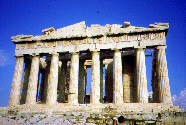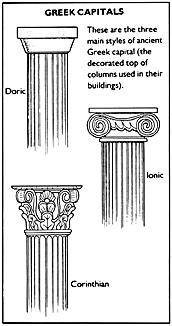
|


|
|
|
Mr. Sedivy's
More Features:
|
Highlands Ranch High School - Mr. Sedivy
World
History:Classical Greece After the dark ages, herding and farming sprang up again. Soon, borders of areas became fixed, each area became independent by 800 BC. There were forts on hilltops for protection, and a polis grew up around each one. The polis was the center of Greek community life. (The plural of Polis is Poleis.) People were Hellenes, or Greeks. Hellas was their word for Greece. There were two main city states: Sparta and Athens. Sparta Background: Every stage of Spartan life was planned. They wanted strong, fearless warriors. Men were trained to be warriors. Sickly babies were left outside to die. People had to bring newborn babies to the government for the government to decide if the baby lived or died. From ages seven to thirty men were required to be in the military. They were taught discipline, strengthened their bodies, learned bravery and endured pain (barefoot in winter, broken bones, etc.). Death in battle was the highest honor, they were taught to never give up. Spartans were expected to marry by age 20, but the polis was more important than family. At a Spartan Marriage a woman's hair was cropped and she dressed like a boy. The ceremony was followed by a simulated rape. The couple did not live together; he continued to live in the boys' dorm, and ate in messes with other men. Polis gave aristocrats land, and helots to farm it. Men retired at 60, but most continued helping the government or taught in military schools. Women managed farms and households. They had to be healthy to produce good warriors so they wrestled, boxed, and raced against men. Women had more freedoms than in other societies. The Spartans became a society of brave warriors, but too one sided. They did not develop arts, trading, literature, etc. They all dressed the same and ate at communal masses. Spartans had one goal - to be militarily strong. They were very much into sports. Tried to stay isolated (didnŐt like the army to be away because they feared the helots would rebel. Sparta remained agricultural and there was no commercial class. They never used money, only an iron currency for internal use. Government: Athens
The people of Athens thought a man's life was empty if he failed to use his mind and develop his talents. Athens started as a monarchy, then an oligarchy (archons), then became one of the first to develop a democracy, "rule by the people." They were also the first to develop laws that came from man instead of from the gods. Draco Solon Pisistratus Cleisthenes Similarities of Greek City - States
Greek city-states were different but the same. They had different governments and ideals, but they spoke the same language, believed in the same gods, read Homer's epics, and competed in the same sports. They considered themselves superior to all others, who were "barbarians." They never had united (they all had too much pride) until the Persians threatened. The Persians had the biggest empire in the history of the world up to that point. The Greeks in Asia Minor rebelled against Persian King Darius (da RYE us). Darius put down the rebellion even though Athens sent 20 ships. Sparta had not helped because it wasn't their problem. Darius attacked Greece. Marathon Another Invasion Day 1: Sparta stopped three attacks and killed thousands. Day 2: Xerxes promised rewards for victory and death for defeat. Sparta won the battles until a traitor, Ephialtes, showed the Persians a way around the mountain pass. The Persians encircled the Greeks and won the battle. The Persians went to Athens and burned it. Athenians, who had a strong navy, had left for Salamis. They tricked the Persians into putting their navy into a narrow waterway. As the Persian ships crowded together, they were mauled by the Greeks. The Greek fleet of 360 ships beat Persia's 1,000 ships. In 479 BC the Persians left. Sparta retreated into itself. Without so much of a Persian threat, Greece could now flourish. Had Persia won, our civilization would be much different. Introduction to Classical Greece Peoples of Ancient Greece: The Development of Greek City
States: Athenian Empire - The Golden Age Historical Periods of | Prehistory
| Mesopotamia & Phoenicians |
|
Highlands Ranch High School ![]() 9375 South Cresthill Lane
9375 South Cresthill Lane ![]() Highlands Ranch, Colorado 80126
Highlands Ranch, Colorado 80126 ![]() 303-471-7000
303-471-7000
Mr. Sedivy's History Classes
| Colorado History | American
Government | Modern European History | Advanced
Placement European History | Rise of England
| World History |
| Home | Back to top of page |
Site Contents |



